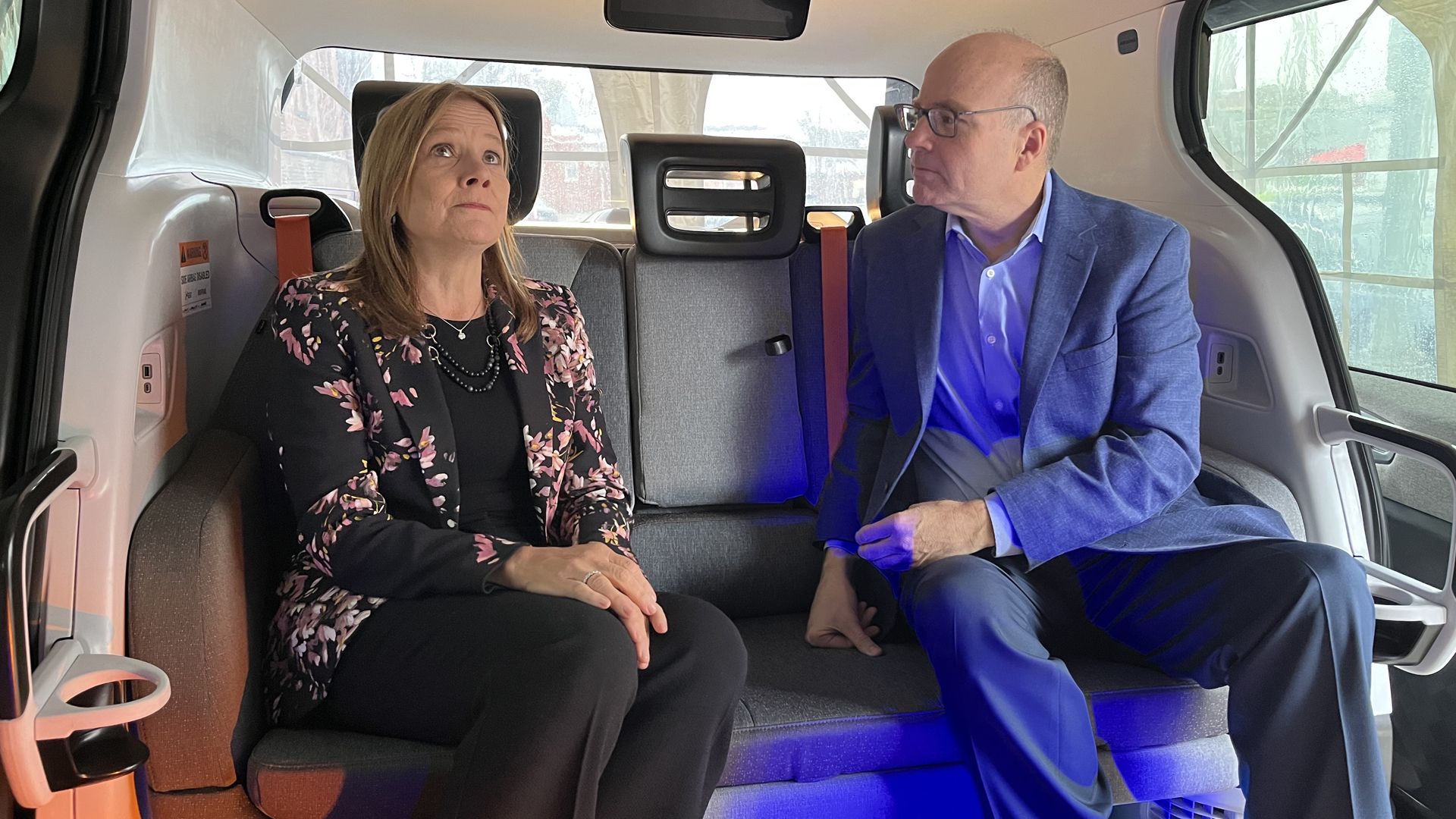| | | | | | | | | | | Axios What's Next | | By Jennifer A. Kingson and Joann Muller ·Apr 06, 2022 | | The What's Next team had a busy and exhilarating day yesterday: It was Axios' inaugural What's Next Summit, with a huge roster of boldface-name speakers and a wandering robot that sold chocolate chip cookies. - If you missed it, check out the livestream here and read our reportage, below.
- Got thoughts on what you read or saw? Email us at whatsnext@axios.com.
🌟 Tomorrow: Join Axios national political correspondent Jonathan Swan at 8:30 a.m. ET for an exclusive interview with Senate Republican Leader Mitch McConnell. Register here to attend virtually. Today's Smart Brevity count: 1,100 words ... 4 minutes. | | | | | | 1 big thing: GM's plan to speed up electric vehicles |  | | | GM CEO Mary Barra gives Axios co-founder Mike Allen a tour of the upcoming Cruise Origin robotaxi. Photo: Joann Muller/Axios | | | | General Motors and Honda are redoubling efforts to make electric vehicles more attainable by 2027, GM CEO Mary Barra said Tuesday at the Axios What's Next Summit, Joann Muller and Noah Garfinkel write. Why it matters: EVs are starting to catch on, but their luxury-car prices put them out of reach for most buyers. Making EVs more affordable is the key to widespread adoption. Driving the news: The two automakers announced earlier Tuesday that they would expand their existing partnership to develop millions of sub-$30,000 EVs in the most popular vehicle categories, including compact crossover utilities. - The future EVs will be based on a new modular platform and use GM's next-generation Ultium battery technology.
What they're saying: "It's an important play to bring not only scale, but speed to make EVs affordable for everyone," Barra told Axios co-founder Mike Allen. - "By 2025, we'll sell more EVs in the U.S. than anyone else. To do that you need a portfolio of vehicles," she said, from compact affordable EVs to super-trucks like the new GMC Hummer EV.
GM has already been able to speed up its EV development because of employees' creativity during the pandemic, Barra said during the summit. - "If ever anyone had told me that we could not only maintain the business but, in some parts, speed up our electric vehicle programs and continue on with the technology development ... I think it just shows the agility, the resiliency and the creativity of our team," Barra said.
Share this story. |     | | | | | | 2. Northrop Grumman announces 5G defense partnership with AT&T |  | | | Kathy Warden, chair, CEO and president of Northrop Grumman. Photo: Chuck Kennedy for Axios | | | | Defense giant Northrop Grumman and AT&T are partnering to create what will be a "military Internet of Things," where sensors, weapons and data will all be connected by a 5G network, Axios' Ashley Gold reports. Driving the news: Kathy Warden, chair, CEO and president of Northrop Grumman, announced the partnership Tuesday at the Axios What's Next summit in Washington, D.C. - The project is a "joint research and development framework" between AT&T and Northrop that will eventually be a 5G-connected network for the Department of Defense.
Why it matters: DoD capabilities linked by a 5G-powered "digital battle network" is a strong example of how the communications technology can be used in high-pressure situations. - Moving beyond connected home thermostats and connected factory processes, 5G is now being studied as an important part of the nation's defense architecture.
What they're saying: "Technology is not the hard part," Warden said. "We have solved the technology challenge. It's the application of it that will move at the speed the government is ready to move along with the industry." - Warden compared the project to the Internet of Things people use in their regular lives, but for the military.
Details: Warden said Northrop plans to be prototyping technology within a year: "The limiting factor will be how quickly it gets adopted and brought into the command and control center." Keep reading. |     | | | | | | 3. Banks and government edge closer to active role in crypto |  | | | Illustration: Shoshana Gordon/Axios | | | | Banks and government have a role to play in developing the digital infrastructure and regulatory framework for cryptocurrency or other digital money solutions, financial leaders said Tuesday at the Axios What's Next Summit. Why it matters: Washington and Wall Street are grappling with whether and how to enable or restrict fintech products that exist in a nebulous space outside the traditional financial system, writes Nathan Bomey of Axios Closer. - "There's a need for plumbing for this to succeed," Ian Mair, head of U.S. public policy for Blockchain.com, said in a breakout session moderated by Axios reporters Kia Kokalitcheva and Lucinda Shen.
- "Who buys a house without plumbing? We want regulation. This industry is not going to succeed without regulation."
The big picture: Traditional banks haven't embraced crypto with open arms. - "Technology is great, but it doesn't always lend itself to solutions that are needed in specific communities," said John Lewis, president of The Harbor Bank of Maryland.
- "We recognize that there is a future for it," Bank of America commercial market executive Liz Shore said, but there's "a large concern" that crypto is currently lacking significant regulation.
Read the rest. |     | | | | | | A message from Axios | | Thank you What's Next Summit sponsors | | |  | | | | On April 5, Axios hosted our inaugural What's Next Summit. We are grateful to our sponsors, Bank of America, Density, Meta and PwC for helping us bring these worthy conversations to life. You can catch up on content here. | | | | | | 4. For smart cities, start with the right definitions |  | | | Illustration: Rebecca Zisser/Axios | | | | Most people don't know exactly what a smart city is, but proper definitions will be key to making sure they can become a reality, writes Ashley writes. Why it matters: According to an Axios-Momentive poll, nearly half of Americans feel uncomfortable about the prospect of living in a smart city, a place where electricity grids, traffic lights and other infrastructure components are networked and internet-connected, Jennifer A. Kingson writes. Driving the news: Until public officials and their private-sector partners do a better job of explaining the benefits of smart city technology, the average person is likely to continue having "big brother" fears and skepticism, participants in an Axios What's Next Summit roundtable said Tuesday. A few themes emerged from the discussion: - Technology for good: Smart city tech should make people's lives better, with the goal of stronger, more inclusive cities, said Steve Benjamin, the former mayor of Columbia, South Carolina, who founded the Mayors' Leadership Institute on Smart Cities.
- Cities should highlight the ways that technology can improve residents' lives. "It's amazing how one bad experience can poison the well," he said.
- The right branding: People can be turned off at the idea of living in a smart city due to old or misinformed ideas. "We need to rebrand the concept of smart cities," said Alina Gorokhovsky, CEO of SCG Legal, a network of law firms.
- Some communities may associate smart cities with a loss of jobs or privacy, she said.
- Smart transit equity: Not everyone can work remotely, which is important to remember when developing cities for the future, said Jenna Klym, director of engagement and external affairs for the Greater Washington Partnership.
- Transit-oriented solutions should be included in any smart city vision, she said.
Read the full story. |     | | | | | | 5. Close encounters between Axios' CEO and a cookie-vending robot |  | | | Axios CEO Jim VandeHei opened the What's Next Summit by introducing a new friend. Photo: Clifford A. Sobel | | | | One of the more popular and attention-hogging guests at the Axios What's Next Summit was the Tortoise, a droid whose makers call it the "first remote-controlled store on wheels." - The Tortoise Mobile Smart Store made its debut last month with several dozen retailers, who are using it to sell their wares — like boxes of cookies — on sidewalks, etc.
- Customers tap to pay, open the lid, take their goods and go on their merry way without interacting with a human.
Brush with fame: After Jennifer wrote about the Tortoise for this newsletter, Stephen Colbert did a riff about it on his show. - On Tuesday, the robot shared the stage with Axios CEO Jim VandeHei, then walked the floor dispensing cookies to guests, accompanied by Dmitry Shevelenko, co-founder of Tortoise.
- "This is the future of how you're going to be able to buy things," Shevelenko said.
Axios technology reporter Ina Fried with Dmitry Shevelenko of Tortoise (center) and the cookie-dispensing robot. Photo: Clifford A. Sobel |     | | | | | | A message from Axios | | Thank you What's Next Summit sponsors | | |  | | | | On April 5, Axios hosted our inaugural What's Next Summit. We are grateful to our sponsors, Bank of America, Density, Meta and PwC for helping us bring these worthy conversations to life. You can catch up on content here. | | | | Was this email forwarded to you? Get your daily dose of What's Next magic by signing up for our free newsletter here. |  | It's called Smart Brevity®. Over 200 orgs use it — in a tool called Axios HQ — to drive productivity with clearer workplace communications. | | | | | | Axios thanks our partners for supporting our newsletters. If you're interested in advertising, learn more here.
Sponsorship has no influence on editorial content. Axios, 3100 Clarendon Blvd, Suite 1300, Arlington VA 22201 | | | You received this email because you signed up for newsletters from Axios.
Change your preferences or unsubscribe here. | | | Was this email forwarded to you?
Sign up now to get Axios in your inbox. | | | | Follow Axios on social media:    | | | | | |










No comments:
Post a Comment